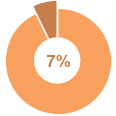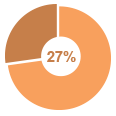We all experience ups and downs in life: we feel happiness during some moments, but we also experience deep sadness when something goes wrong. These fluctuations are all healthy, but when a person experiences a prolonged period of deep melancholy—of true hopelessness and despair—the individual may be struggling with symptoms of depression.
Depression is not merely a “blue” feeling. It is different from temporary moments of sadness we may experience. Depression is a true mental health disorder. It brings a feeling of aimlessness or gloom that seems “random” or untethered to any particular life event. Depression can even give the individual a feeling of hopelessness. However, it is important to know that there is always hope for recovery from depression, and even those with intense struggles can once again function in a happy, healthy way.
What are the Warning Signs of Depression in Men?
Differentiating depression from everyday sadness can be difficult, however, there are several signs and symptoms that can help you identify if your loved one or friend may be dealing with depression. Here are some indicators that are especially evident in men with depression:

Feelings of hopelessness or despair.

Loss of interest in everyday activities.

Changes in appetite or weight.

Sleep changes (insomnia or oversleeping)

Irritability.

Sluggishness
What are the Causes of Depression in Males?
There is hope for men experiencing these symptoms of depression with the encouragement and support of family, and treatment from the WestBridge team, lifelong recovery is obtainable. The first step is to learn more about depression, including its causes.
There are several factors that can cause depression in men—among them are:
- Genetics: Men who have a family history of depression are at a higher risk for developing symptoms of depression.
- Brain chemistry and hormones: When you have depression, your brain scan will look different from that of someone without it. Hormone levels can also differ and affect brain chemistry.
- Stress: Anything from a taxing work environment to the loss of a loved one can be a trigger for depression.
What are Different Types of Depression?
It cannot be overstated: Depression is not merely the feeling of sadness. Actually, depression is a mental health disorder that can come in various forms and in differing degrees of severity. The first step toward getting effective treatment is determining the specific type of depression, and then treating accordingly. The most common types of depression are:
Major Depressive Disorder
For those who feel depressed most of the time, or for most days out of the week, major depressive disorder is a common diagnosis—and one that can often be treated with individual and group therapies.
Seasonal Affective Disorder
Seasonal affective disorder, or SAD, is a period of depression that coincides with the winter months, when days are both shorter and darker.
Dysthymia (Chronic Depression)
This condition refers to a depression that may be more mild in its effect, but potentially long-lasting; often, it persists for years.
The Connection Between Depression and Substance Use
Substance use disorders are common among those who experience symptoms of depression—and as with most co-occurring disorders; the connection is a complex one. Both depression and substance use disorders have roots in brain chemistry, and the same brain vulnerabilities that sometimes contribute to depression, can contribute to substance use.
Self-medication is another concern. Those with severe depression may turn to substances like alcohol and/or other substances to help numb their pain or mitigate their sadness. This is vicious cycle though. For instance, Alcohol is a central nervous system depressant, and substance use can actually deepen symptoms like lethargy, sadness and despair.
For those experiencing co-occurring disorders, such as depression and substance use, dual diagnosis care is a recommended way to ensure the root of the issue is treated.
Depression Statistics in America
Depression is an all-too-common occurrence in the United States, affecting not just men but people of all ages, backgrounds and lifestyles. Consider some of the statistics concerning depression in America:

Major depressive disorder alone affects more than 4.8 million American adults each year; that is close to 7 percent of the population.

Meanwhile, 27 percent of those who struggle with substance use disorders also experience symptoms of depression.

The good news is that 80 percent of those who are treated for depression show an improvement in their condition within a matter of weeks.
How to Cope with Depression
Those who experience symptoms of depression often struggle to make changes or tackle the challenges they face; that is no reason to panic, or to feel inadequate or weak. Hopelessness is a symptom of depression, not a personal failing. The important thing is to ask someone for help—to reach out to a friend or loved one for support.
There are also some key lifestyle changes to make—including finding healthy outlets for stress management, prioritizing good nutrition and regular sleep, and building positive, healthy relationships.
Seeking integrated dual diagnosis treatment at WestBridge can also be a key step down the road to recovery.
How to Help a Friend or Loved One with Depression
Similarly, it is important to remember that your friend or loved one who is dealing with depression may feel helpless or unable to make positive changes. Reaching out with compassion, care and encouragement can make a whole world of difference. Remember that what someone with depression needs a support system—people to offer unconditional love, but to urge them to seek professional treatment and care.
If you have a friend or loved one struggling with symptoms of depression, call WestBridge to learn more about the programs we offer.
WestBridge Provides Treatment for Depression and Co-occurring Substance Use Disorders
The important thing to understand about depression is that it is not just a “feeling” or a period of sadness. Depression is a true mental health disorder, and in many cases, it co-occurs with other serious disorders, including substance use. These co-occurring disorders are not typically issues that can be resolved without compassionate, clinical care.
We offer integrated dual diagnosis care that gets to the root of the problem and extends personalized care to those in need. Our Evidence-Based approach gets results, and helps our participants find their way to lifelong healing and recovery.
If you or someone you know is struggling with depression, take the first step toward hope today by contacting WestBridge.